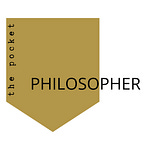χαλεπὰ τὰ καλά
Nothing beautiful without struggle.
—The Republic of Plato
Fellow philosophers,
Welcome to a new week at TPP!
We’re launching a special two week series with a crash course covering the basics from some of the greatest minds in history.
This week, we’ll be focusing on the path of what I’m going to call Euro-Centric philosophy, and next week we’ll consider what I’ll call Ex-European philosophy.
This isn’t a perfect way to organize the world’s thought, but with only two weeks plus the natural way that historical institutions have divided philosophical knowledge, it works out well for our purposes.
Each day we’ll explore 4 categories according to the philosopher:
Epistemology — Theory of knowledge, or how do we know what we know
Ethics — What is the good life
Ontology — The object of study
Greatest Work — Just an opinion from your truly
Without further ado, let’s kick it off with Plato!
Epistemology
Plato was the student of Socrates. If you’ve ever heard of the Socratic method—the discovery of knowledge by means of questioning—you’ll understand the basic tenants of Plato’s view regarding knowledge.
He held to a notion that each of us had an innate source of eternal knowledge (the nuos, or soul) that originated from a higher realm of sorts he called The World of Forms. He believed the teacher—through questioning—helped a student discover this innate wisdom.
Whether this was a literal belief or not is up for debate, but it drove his philosophy and writing.
Ethics
For Plato, ethics was a discipline which cultivated the good life—or Eudaimonia in Greek. This was the goal of all Greek ethical philosophy.
For Plato, Eudaimonia was only possibly when one had a good relationship with, and access to their nuos or internal, eternal source of wisdom.
Therefore, Plato believed that thoughtful people were the happiest people and this was the highest ethical end.
Ontology
The best way to think about this answer is through the painting School of Athens (below.)
In this painting we find Plato and his student, Aristotle at the center. Plato holds his hands to the sky, while Aristotle his hand outstretched to the earth.
Plato’s subject of study was the invisible, higher world of forms—the perfect state of things one might say.
Aristotle, on the other hand, set his study to what was—nature, observation, and biology.

Greatest Work
This is obviously an opinion question, but I’d have to point you to The Republic of Plato. In this work we encounter some of his most famous parables, get an understanding for his relationship with Socrates (his instructor), and get a glimpse into the ideas which drove his philosophy.
You can download a free PDF here!
I hope you enjoyed day 1 of our crash course, I’ll see you tomorrow as we study the Roman Philosopher-King, Marcus Aurelius.
Until then,
Matt
References:
https://www.goodreads.com/work/quotes/1625515
https://en.wikipedia.org/wiki/Platonic_epistemology
https://www.mvorganizing.org/what-is-the-meaning-of-good-life-according-to-plato/










